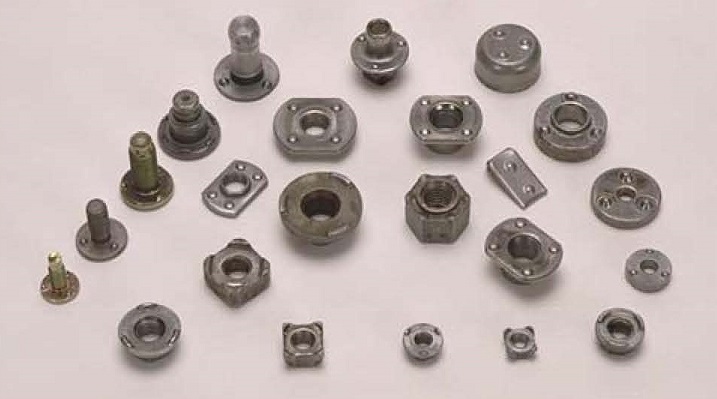You stated that all runs well but once in a while you have a bad push out on your nut welding. Apparently your weld schedule works and produces good welds but some variable is causing discrepancies occasionally. Let’s address the important factors in projection welding.
It is important that you have good equipment alignment so that you apply force to all projections on the nut at the same time and with equal force. Next the force system of your welder or gun must be able to move quickly as the projections collapse in order that full force is maintained. This is called fast follow up. A large press welder not properly equipped or a sticking cylinder or a slow servo could cause a problem.

FAST FOLLOW UP HOLDER
Projection consistency is important. Any variation in the projections on the nut will be an issue leading to inconsistencies. Nut feed consistency is imperative. If the feeder misplaces the nut it can lead to a momentary misalignment that squeeze time does not correct. Some projection welds are very fast with little or virtually no squeeze time. Though short some squeeze time may be necessary.

Projection Weld Nuts and Studs
If there an insulated locator pin. Is the insulation worn? Are there signs of arcing? The current could be shunting through the pin and bypassing the projections. Additionally it may be damaging the threads.
Is there a buildup of flash/residue that is interfering with alignment or causing a current/shunting path?
The fact that you have a working process most of the time indicates a variable is present that needs to be controlled. Other than a tweak the schedule is probably pretty close.
Additional helpful articles in this blog on this topic can be found in:
"WHY DO THE PROJECTION WELD PUSH OFF TESTS FAIL WHEN THE MATERIAL AND WELD NUTS HAVE NOT CHANGED?"
Reference schedules for nut and projection welding can be found in:
AWS Standard C1.1:2012 Recommended Practices for Resistance Welding
Ref: CMW Inc. Catalog
RWMA: Resistance Welding Manual, Section 3
AWS: Standard C1.1:2012 Recommended Practices for Resistance Welding

